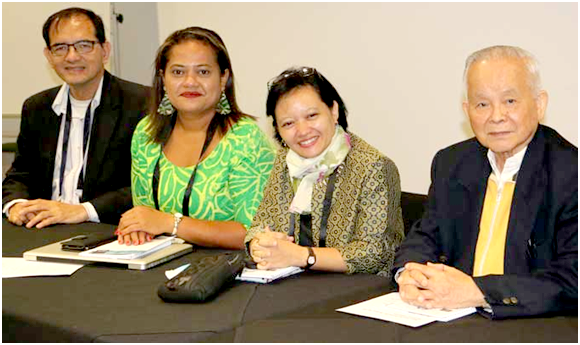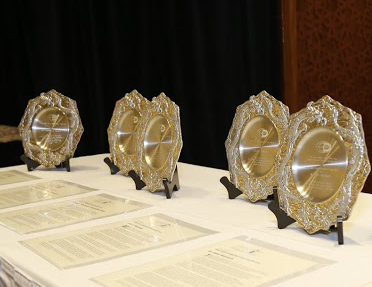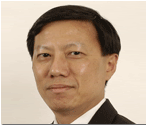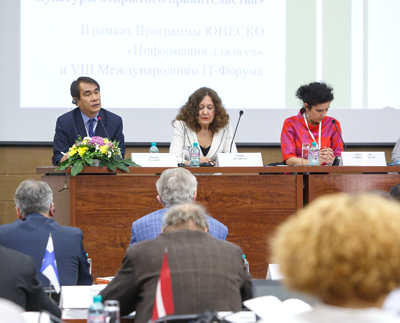
Aug 8, 2016 | News
 AMIC Board Chair Crispin C. Maslog (right) and former AMIC Secretary-General Jose Ma. Carlos (left) participated in the fourth World Journalism Educators Congress in Auckland, New Zealand, July 14-16. (The two women in the panel are from left Vicky Lepou of Samoa and Hermin Indah Wahyuni of Indonesia).
AMIC Board Chair Crispin C. Maslog (right) and former AMIC Secretary-General Jose Ma. Carlos (left) participated in the fourth World Journalism Educators Congress in Auckland, New Zealand, July 14-16. (The two women in the panel are from left Vicky Lepou of Samoa and Hermin Indah Wahyuni of Indonesia).
Dr. Maslog was sponsored by the New Zealand Foundation and Joe Carlos was funded by the Pacific Media Centre in Auckland, headed by Dr. David Robie, AMIC Asia Communication Awardee in 2015.
The World Journalism Education Congress (WJEC), with the theme Identity and Integrity in Journalism Education, kicked off with a formal pōwhiri ceremony hosted in the Sir Paul Reeves building at the Auckland University of Technology (AUT).
 The traditional welcome was led by AUT students and staff. The conference brought together more than 220 media and journalism educators from 42 countries around the world for three days of discussions about global media challenges and education.
The traditional welcome was led by AUT students and staff. The conference brought together more than 220 media and journalism educators from 42 countries around the world for three days of discussions about global media challenges and education.
Maslog and Carlos participated in the panel on Post-Cop 21 – Journalism Education in Asia-Pacific: Responding to Key Issues on Climate Change. The panel, chaired by Robie, was unanimous in saying that there is a critical need to educate journalists in the region on the problems brought about by climate change, and for the schools to start offering courses on environmental reporting. So far very little is done in this area.
Maslog also joined another panel on Global Mass Communication and Journalism Research, chaired by Dr. Alex Tan of Washington State U in the U.S. The panel was meant to provide input to a book on research being planned by Dr. Tan.
The Congress voted on Paris as the site of the next WJEC Congress three years from now in 2019.

Jul 22, 2016 | AMIC Communication Awards
 The Asian Media Information and Communication Center (AMIC) recognizes outstanding achievements in communication research, education, institution building, and journalism through the AMIC Asia Communication Award.
The Asian Media Information and Communication Center (AMIC) recognizes outstanding achievements in communication research, education, institution building, and journalism through the AMIC Asia Communication Award.
Past awardees include eminent communicators and journalists:
Dr. John Lent, 2006
Prof. Eddie C. Y. Kuo, 2007
Dr. Nora Quebral and Dr. Florangel Rosario- Braid, 2008
Dr. Binod Agrawal and Dr. K. E. Eapen, 2009
Dr. Hidetoshi Kato, 2010
Dr. Georgette Wang and Dr. Crispin Maslog, 2011
Tan Sri Dato’ L. Krishnan, 2012
Dr. Alwi Dahlan and Mr. Jakob Oetama, 2013
Mr. Juan L. Mercado, 2014
Dr. Alan Hancock and Dr. David Robie, 2015
Nominations for the 2016AMIC Asia Communication Award are now being accepted from AMIC members. The closing date for nomination is on 30 September 2016. Please accomplish the nomination form, which can be downloaded from www.amic.asia. Send the form, together with a nomination letter, to:
Mr. Ramon R. Tuazon
Secretary-General
Asian Media Information and Communication Centre (AMIC)
E-mail: r.tuazon@amic.asia or rrtuazon722@yahoo.com
Jul 19, 2016 | Member Updates, News
After transferring to the Philippines and completing all aspects of its legal registration with various government agencies, AMIC is now opening its membership campaign for 2016.
AMIC offers two kinds of membership: individual and institutional.
Individual members have the option to enroll only as a basic member, or subscribe also to one or both AMIC publications Asian Journal of Communication and/or Media Asia.
Meanwhile, academic and research institutions in media and communication, and organizations of practitioners can apply for AMIC institutional membership.
AMIC institutional members are entitled to the following:
- Free subscription to printed copy of Asian Journal of Communication, Volume 26 Numbers 1 to 6
- Free subscription to printed copy of Media Asia, Volume 43 Numbers 1 to 4
- Preferred rate for access to online editions of Asian Journal of Communication
- Free access to online editions of Media Asia past issues
- Opportunities to participate and present papers in AMIC’s annual international conference and avail of discounted conference fee
- Discounted rate for AMIC book publications
- Discounted rate for AMIC-sponsored seminars and workshops
- 20% discount for selected Taylor & Francis publications
- Networking opportunities with communication and media professionals and academics
AMIC members have three ways of paying membership dues: (1) payment through check to be sent to AMIC Secretariat office or AMIC Country Representative; (2) payment through bank remittance in favor of Asian Media Information and Communication Centre, Inc.; and (3) payment in cash to AMIC Country Representative or AMIC Secretariat at AIJC.
Individual and institutional membership forms have already been sent to AMIC Country Representatives. Each form lists benefits for each type of membership, and payment options.
AMIC hopes members will remain committed to the organization as it endeavors to initiate more programs and projects and provide learning and training opportunities for the professional growth of its members.

Jul 4, 2016 | News
 Dr. Ang Peng Hwa, AMIC Chairman d’Honneur, will serve as the keynote speaker of the International Conference on Media, Communications, and Sociology (iCOMICOS). It will be held in Yogyakarta, Indonesia on November 18-19, 2016.
Dr. Ang Peng Hwa, AMIC Chairman d’Honneur, will serve as the keynote speaker of the International Conference on Media, Communications, and Sociology (iCOMICOS). It will be held in Yogyakarta, Indonesia on November 18-19, 2016.
Conference theme is Questioning Locality: Community, Movement, and Global Challenge.
iCOMICOS is being organized by the Faculty of Social and Political Sciences of the Universitas Atma Jaya Yogyakarta.
The forum will examine the impact of the ICT revolution on social movements within and outside geographic and socio-cultural borders. New ICT tools and applications have empowered non-state social actors, especially social activists who are actively pursuing change in society.
Among the sub-themes to be featured in the forum are media praxis, journalism revolution, creative marketing cooperations, customized stakeholder engagement, community-based business, innovative business communication, and information policy and ethics revisited.
Aside from Dr. Ang Peng Hwa, other speakers include Prof. Anne Gregory (University of Huddersfield, UK), Akihiko Kohno (McCann Erickson Japan); Dr. Loreto G. Camiloza (De La Salle University Dasmarinas); Bambang Kusumo Prihandono, MA (Universitas Atma Jaya Yogyakarta); and Dr. Phil Martin Loeffelholz (Universitas Illmenau, Germany).
For more details about the conference, please visit:
https://comicos.uajy.ac.id/wp-content/uploads/2015/07/Publication-iCOMICOS-UAJY-2016.pdf

Jul 4, 2016 | News
 Public Information Officers (PIOs) worldwide should be among the prime movers in the pursuit of open government. This was the main message of AMIC Secretary General Ramon R. Tuazon during the International Conference on Media and Information Literacy for Building a Culture of Open Government. It was held in Khanty-Mansiysk, Russian Federation from June 6 to 10, 2016.
Public Information Officers (PIOs) worldwide should be among the prime movers in the pursuit of open government. This was the main message of AMIC Secretary General Ramon R. Tuazon during the International Conference on Media and Information Literacy for Building a Culture of Open Government. It was held in Khanty-Mansiysk, Russian Federation from June 6 to 10, 2016.
Mr. Tuazon was one of the plenary speakers of the forum. According to him, PIOs play a key role in promoting and pursuing transparent, accountable, and citizen-oriented governance. These values are consistent with open government principles.
However, he warned that PIOs face challenges in the practice of open government. Traditional values, mindsets, and customs in the working environment—specifically, the governance culture in some countries —can pose hindrances to an open government. Prevailing governance culture in many societies includes “culture of silence” and “culture of good news only.”
To Tuazon, the culture of open government demands reengineeringpublic information principles and work processes as well as developing appropriate competencies and mindsets, as there is still resistance among many governments to easy access to information by the public.
What are some actions needed?
According to the AMIC SG, there should be recognition and acceptance among traditional PIOs that change is inevitable and must be reflected in all dimensions of competencies—knowledge, attitudes, values, and behaviors.
Tuazon called for more investment in public information work as there seems to be underinvestment in the area compared with expenses in public infrastructure.
Tuazon also believed that public information should not be perceived as a separate element of governance. Transparency, accountability, and citizen participation should be second nature to all government transactions and programs.

 AMIC Board Chair Crispin C. Maslog (right) and former AMIC Secretary-General Jose Ma. Carlos (left) participated in the fourth World Journalism Educators Congress in Auckland, New Zealand, July 14-16. (The two women in the panel are from left Vicky Lepou of Samoa and Hermin Indah Wahyuni of Indonesia).
AMIC Board Chair Crispin C. Maslog (right) and former AMIC Secretary-General Jose Ma. Carlos (left) participated in the fourth World Journalism Educators Congress in Auckland, New Zealand, July 14-16. (The two women in the panel are from left Vicky Lepou of Samoa and Hermin Indah Wahyuni of Indonesia). The traditional welcome was led by AUT students and staff. The conference brought together more than 220 media and journalism educators from 42 countries around the world for three days of discussions about global media challenges and education.
The traditional welcome was led by AUT students and staff. The conference brought together more than 220 media and journalism educators from 42 countries around the world for three days of discussions about global media challenges and education.

 The Asian Media Information and Communication Center (AMIC) recognizes outstanding achievements in communication research, education, institution building, and journalism through the AMIC Asia Communication Award.
The Asian Media Information and Communication Center (AMIC) recognizes outstanding achievements in communication research, education, institution building, and journalism through the AMIC Asia Communication Award.
 Dr. Ang Peng Hwa, AMIC Chairman d’Honneur, will serve as the keynote speaker of the International Conference on Media, Communications, and Sociology (iCOMICOS). It will be held in Yogyakarta, Indonesia on November 18-19, 2016.
Dr. Ang Peng Hwa, AMIC Chairman d’Honneur, will serve as the keynote speaker of the International Conference on Media, Communications, and Sociology (iCOMICOS). It will be held in Yogyakarta, Indonesia on November 18-19, 2016. 
 Public Information Officers (PIOs) worldwide should be among the prime movers in the pursuit of open government. This was the main message of AMIC Secretary General Ramon R. Tuazon during the International Conference on Media and Information Literacy for Building a Culture of Open Government. It was held in Khanty-Mansiysk, Russian Federation from June 6 to 10, 2016.
Public Information Officers (PIOs) worldwide should be among the prime movers in the pursuit of open government. This was the main message of AMIC Secretary General Ramon R. Tuazon during the International Conference on Media and Information Literacy for Building a Culture of Open Government. It was held in Khanty-Mansiysk, Russian Federation from June 6 to 10, 2016.